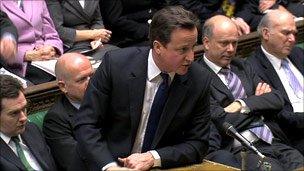Libya: How much UK political support has David Cameron?
- Published

Mr Cameron appears to have MPs' support for the action - but will it last?
The outright opposition was confined to a few isolated voices, mainly in the Labour Party, but there are many more with serious doubts and reservations about where this will all end.
In particular concern focuses on the possible use of British ground troops.
Downing Street has so far strenuously sought to dampen down any suggestion that there could be "boots on the grounds", but it has carefully not ruled out the possible use of special forces.
However the unease among MPs goes further and centres on deployment of regular British and other ground troops if Colonel Gaddafi survives the initial air onslaught.
MPs in all parties point to the ambiguity of the UN resolution which simply precludes the use of "an occupying force".
This, it is argued, is a deliberately vague phrase which could open the way for military involvement on the ground provided there was no suggestion that coalition forces were seeking to occupy Libya.
Significantly Labour, who have so far fully backed the intervention, have said they want reassurances from the prime minister that ground troops will not be deployed.
There is also concern over the level of Arab support for the intervention with so far only Qatar - who have offered to deploy four of its Mirage combat jets - poised to take part in enforcing the no-fly zone.
And then there are the doubts over the end game.
What happens when and if Colonel Gaddafi is toppled? Will Britain get sucked into supporting some interim administration? Will the UK have to assist in the dismantling of Colonel Gaddafi military and government machine?
What could lead to a fracturing in political support is if public opinion begins to move against the war - polls suggest that a majority of the public backs the idea of a no-fly zone in Libya.
That support, however, falls away markedly the more involved Britain becomes - through the possible use of supplying the Libyan rebels with arms, or the use of special forces, or the deployment of ground troops.
If public opinion begins to fray, then many MPs may not be far behind.
Hence, just as the outcome and course of this conflict remains uncertain, so too political opinion remains fluid and far from fixed.
And such political doubts and tensions are only likely to mount the longer the conflict goes on.
In the House of Commons, David Cameron enjoyed overwhelming parliamentary support for his stance - but he will know that it is very far from a blank cheque.